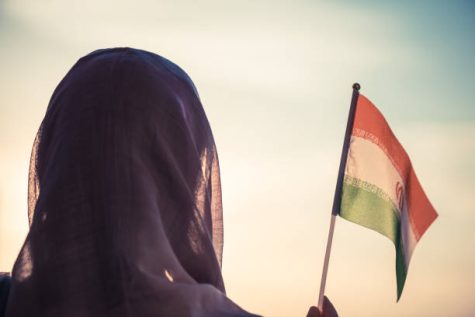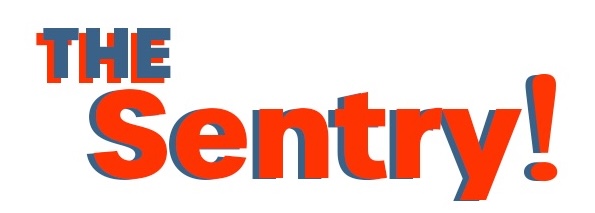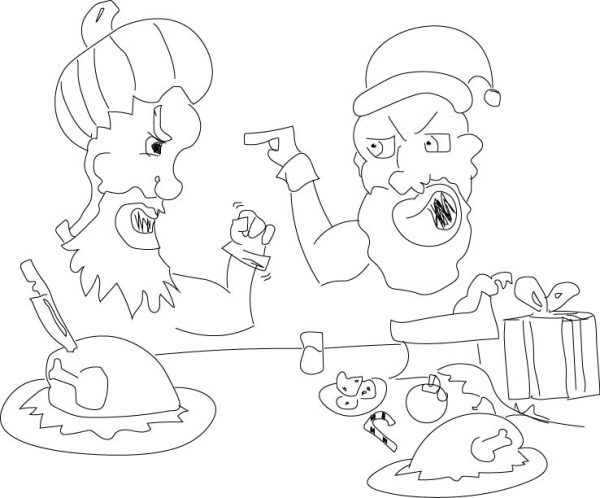OPINION: Mahsa Amini’s death brings international awareness to Iranian issues
OPINION from Issue 3
It’s a startlingly familiar yet a tough scene to depict: thousands of protestors crowd the streets in solidarity with Iranian women. The gatherings are an echo of the protests in Iran collectively targeting awareness of women’s rights, government accountability, and cultural shame. The recent protests have stemmed from the death of 22-year-old Mahsa Amini, who had been detained by the country’s so-called morality police. Subsequently, these protests have brought international awareness of the heinous crimes committed against the women in Iran.
Mahsa Amini, a young Iranian woman, was pulled off the streets of Tehran by the country’s notorious morality police and taken to a “re-education center” for lessons in modesty last week. Inside the centers, detainees are given classes about Islam and the importance of the hijab (or headscarf), and then forced to sign a pledge to abide by the state’s clothing regulations before they are released. In short, Iran’s morality police have terrorized women for decades–serving as a powerful, terrifying consequence to Iranian women for having self-expression. Three days later, she was dead. Authorities claimed that she suffered a stroke, causing the coma to which she later succumbed at a Tehran hospital. Amini’s family and eye witnesses say violent assault was the true cause of her death.
These demonstrations are the biggest, most widespread challenges to Iran’s leadership since the 2009 Green Movement protests, which drew millions to the streets following a disputed presidential election. As of October 4th, the Iran Human Rights group, an Oslo-based nonprofit, estimates that Iranian authorities have killed at least 154 people since the start of the protests.
As for what is the morality police, it is an element of Iran’s Law Enforcement Forces (LEF). The police force arrests women for wearing “inappropriate” hijab and enforces other restrictions on freedom of expression. Culturally-speaking, the morality police are meant to regulate and enforce the conservative, old-fashioned Iranian values that their government believes to be integral to the procession of their society. Realistically speaking, morality police have been the bane of women’s existence in Iran for decades. Not only has the morality police cost the lives of hundreds of women, it is an integral part of government function in Iran. According to the U.S. Department of State, individuals that hold government jobs in Iran, like Esmail Khatib (Iran’s Minister of Intelligence) and Salar Abhnoush (the deputy commander of the Basij, a paramilitary militia and a subsidiary force of the Islamic Revolutionary Guard Corps), have been involved in the suppression and killing of non-violent protesters. Because the morality police is a government issue with Iran, it will bring international governments and Iran to a head.

It is no secret to anyone remotely aware of human rights that the morality police (and thus, the Iranian government as a whole) are actively working against human rights. Self expression as an action is condemned by the government, and young Iranians are forced to evolve within the oppressive system in order to live their lives.
We need to consider the double-edged sword that these international protests are–and the consequences that will therein lie for Iranian women. Take Christian Amanpour, a renowned foreign correspondent, who was abandoned by Iran’s President after Amanpour declined the head scarf demand. Not only is it unlikely that these protests will drive positive action by the Iranian government, they might make the government more defensive, prompting a more violent reaction from the military to these protests–thus killing more civilians. Despite international attention, and protests across the globe, the regime has refused to yield to the protesters’ demands, instead continuing repression of the demonstrations via violence and internet shutoffs. Iran’s supreme leader Ayatollah Ali Khamenei has characterized the protests as riots “designed by America and the Zionist regime, and their employees” to undermine the government’s authority.
There is no right answer to this question of civilian safety and a defensive government. Although protests and general unrest is a double-edged sword, women in Iran cannot afford to continue to be more and more oppressed by this uber-conservative government. Iranian officials need to learn that their country and economy cannot afford to live in this world, cooperating and associating with modern countries with proper human rights treatment, and yet simultaneously treat their civilians obscenely.
Luckily, governments across the globe are responding to Iran’s crackdown on protests. In response, multiple nations have begun issuing sanctions and other restrictive responses. U.S. sanctions targeted high-ranking officials within the morality police and others responsible for the human rights abuses taking place in the country. The Treasury Department also announced that it would allow American tech firms to expand their business in Iran, where most internet access has been cut off. In addition, Canada has put sanctions on 34 Iranian officials and entities, among them the morality police, Iran’s Ministry of Intelligence and Security and the Islamic Revolutionary Guard Corps. Multiple countries within the European Union–for example Denmark, Germany, France and Italy–have begun calling for EU sanctions against the Iranian government. Cynically-speaking, lots of people will not begin to consider international issues (especially that of such a closed-off country like Iran) unless there are economic sanctions that could potentially affect them, either directly or indirectly.
In terms of the clashing of opinions, this situation is yet another example of the collision between societal values and economical values. The Iranian government will likely remain obstinate, but they need to know that most of the countries that retain vast political and economic power around the world value human rights. Meaning that if Iran continues to treat their civilians the way they do, they will suffer at the hands of strict economic restraints.






